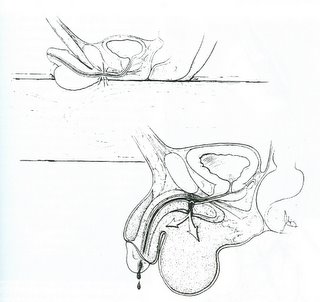Wednesday, February 01, 2006
Tales of The Trauma Service XV
Young man is a unrestrained back seat passenger in a MVC. CT shows an small intracranial bleed. No other injuries are found. He is awake and alert. A foley is not placed, and since this was one of my partner's cases, I am unsure if he underwent one of those new-age evaluations. He then began to complain of urgency and the inability to void. A foley was unable to be passed and his proximal thigh began to swell. Based on all this a cystogram was ordered:

The black lines represent the CT contrast in his bladder. The blue line represents extravasation of contrast from a urethral injury. He underwent bedside percutaneous cystostomy tube placement and was discharged to home with urologic follow-up on postinjury day six.
The mechanism? Probably the so-called "straddle injury" seen here:

The urethra is trapped between the symphisis pubis and an inflexible object. This injury can result from playground injuries as well.
Young man is a unrestrained back seat passenger in a MVC. CT shows an small intracranial bleed. No other injuries are found. He is awake and alert. A foley is not placed, and since this was one of my partner's cases, I am unsure if he underwent one of those new-age evaluations. He then began to complain of urgency and the inability to void. A foley was unable to be passed and his proximal thigh began to swell. Based on all this a cystogram was ordered:

The black lines represent the CT contrast in his bladder. The blue line represents extravasation of contrast from a urethral injury. He underwent bedside percutaneous cystostomy tube placement and was discharged to home with urologic follow-up on postinjury day six.
The mechanism? Probably the so-called "straddle injury" seen here:

The urethra is trapped between the symphisis pubis and an inflexible object. This injury can result from playground injuries as well.
Labels: Tales from the Trauma Service
|





